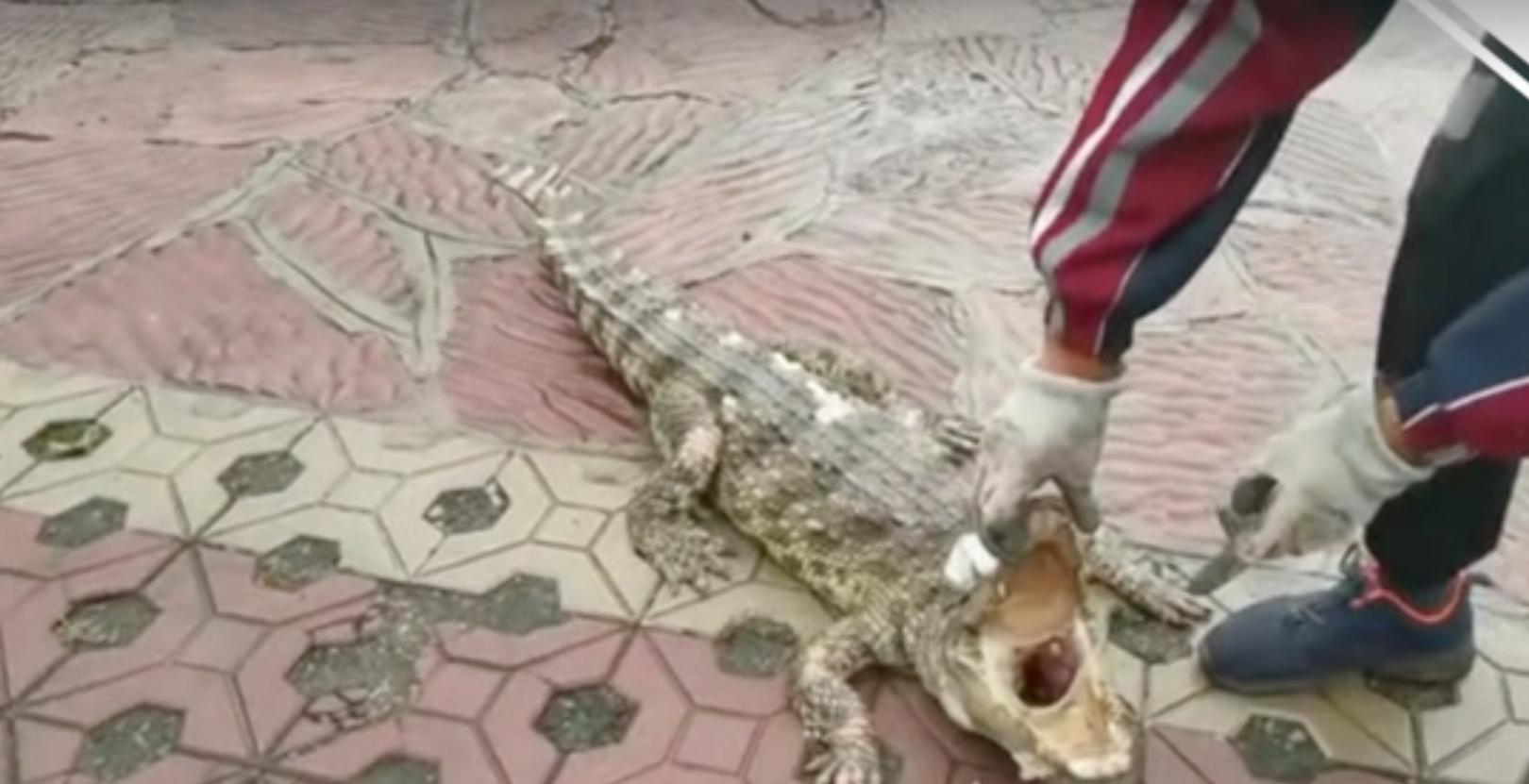
On September 16, the local police station received reports from villagers that two crocodiles had been released from Jingniang Lake in Wu'an, and the relevant departments launched a search and arrest. Screenshot /Beijing News our video
On September 16, the public reported that crocodile cubs had been illegally released from the West Branch Reservoir (Jingniang Lake) in Wu'an City, Handan City, Hebei Province. Unfortunately, just a few days after the release, the crocodile was found and caught ashore and died.
This is another tragedy in which the release of life has become a killing.
Release is subject to scientific evaluation
For the release of wild animals, China has the Wildlife Protection Law to regulate it, and the law is based on scientific research and investigation.
On January 1, 2017, the revised Wildlife Protection Law came into effect, which specifically stipulates two situations of release. First, the release of alien species bought in the market is prohibited, otherwise it will be punished; the other law allows the release of local species, but it cannot affect the production and life of local residents, cause losses to property, and must be carried out under the guidance of scientific institutions, and cannot be released at will, otherwise, it must bear corresponding legal responsibilities.
The crocodiles released this time belong to endangered wild protected animals and are listed internationally by the Convention on International Trade in Endangered Species of Wild Fauna and Flora as Category I protected endangered wild animals and plants. The Yangtze crocodile (Chinese crocodile), which is endemic to China, is listed as a national first-class wild protected animal. Releasing crocodiles and finally causing the death of crocodiles is an illegal act, and the relevant departments will also punish according to the corresponding consequences.
According to the relevant laws and regulations, whether crocodiles can be released must be confirmed and evaluated by animal research institutions and management departments: whether the released animals are local animal breeds; whether they will affect the lives of local residents after release.
Apparently, the crocodile released this time has not undergone such an evaluation.
Reservoirs are not suitable for crocodiles to survive
Each organism has a unique living environment, including habitat, predation, breeding and reproduction, etc., only the conditions are suitable, in order to survive and obtain population continuation, crocodiles are no exception.
Crocodiles belong to the chordate phylum Lizards, carnivorous oviparous vertebrate reptiles, the oldest reptiles of the same era as the dinosaurs more than 200 million years ago, and one of the most primitive animals that have survived so far.
Although crocodiles have survived and multiplied to this day due to their strong vitality, and have become one of the oldest living "living fossils" on the earth, crocodiles have special requirements for the living environment, due to environmental restrictions, coupled with too much hunting, have long become endangered species.
The living environment of crocodiles, the first need is the appropriate temperature, the best temperature is 27-34 degrees Celsius, even the hatching of young crocodiles are also affected by temperature, 28-30 degrees Celsius hatching larvae are generally female, 32-35 degrees Celsius hatching pups are male. Therefore, crocodiles are mostly distributed in tropical and subtropical regions such as Africa, Central America, and southern Asia, and only the Yangtze crocodile in China and the Mississippi crocodile in North America are distributed in temperate zones.
Secondly, crocodiles prefer to live in an environment with a humidity of 60%, so the suitable environment for crocodiles is the wet area of lakes, swampy beaches or hilly mountain streams and grass basales. Even if you inhabit the river part of the time, you need to have wetlands, trees and other environments on both sides to survive.
The reservoir released this time is obviously not the crocodile's favorite wetland environment. Although the release site of Handan, Hebei Province, belongs to the temperate semi-humid monsoon climate, the average annual temperature is 13.5 degrees Celsius, the average temperature in the coldest month (January) is minus 2.3 degrees Celsius, and the average temperature in the hottest month (July) is 26.9 degrees Celsius, so natural conditions are not suitable for crocodiles to survive.
Moreover, crocodiles mainly feed on fish, waterfowl, hares, deer, frogs, etc., while in addition to fish in the reservoir, there are fewer other animals suitable for crocodiles to prey on. In addition, the released crocodiles are less than 1 meter long artificially bred crocodile cubs, and the survival ability in the wild is significantly weaker, and the probability of death after release is greater.
Blindly releasing crocodiles has another obvious risk factor compared to blindly releasing other animals, such as fish. As ferocious predators, crocodiles not only feed on fish, mud crabs, turtles, monitor lizards, birds, but also on large animals such as wild deer, bison, and wild boar. In Africa's annual migration across the Mara River, wildebeests, zebras, etc. have become the food of crocodiles, which has become a thrilling natural drama.
If humans are not protected, they may also become the food of crocodiles. Therefore, the release of crocodiles will pose a threat to the lives and health of local people, and it is one of the animals that are forbidden to be released.
Therefore, no matter from which point of view, the death of the crocodile after the release has sounded the alarm bell for us again: we cannot blindly release it in the name of doing good.
Contributing Writer 丨 Zhang Tiankan (Columnist)
Editor 丨 Xu Qiuying
Proofreading 丨 Zhao Lin